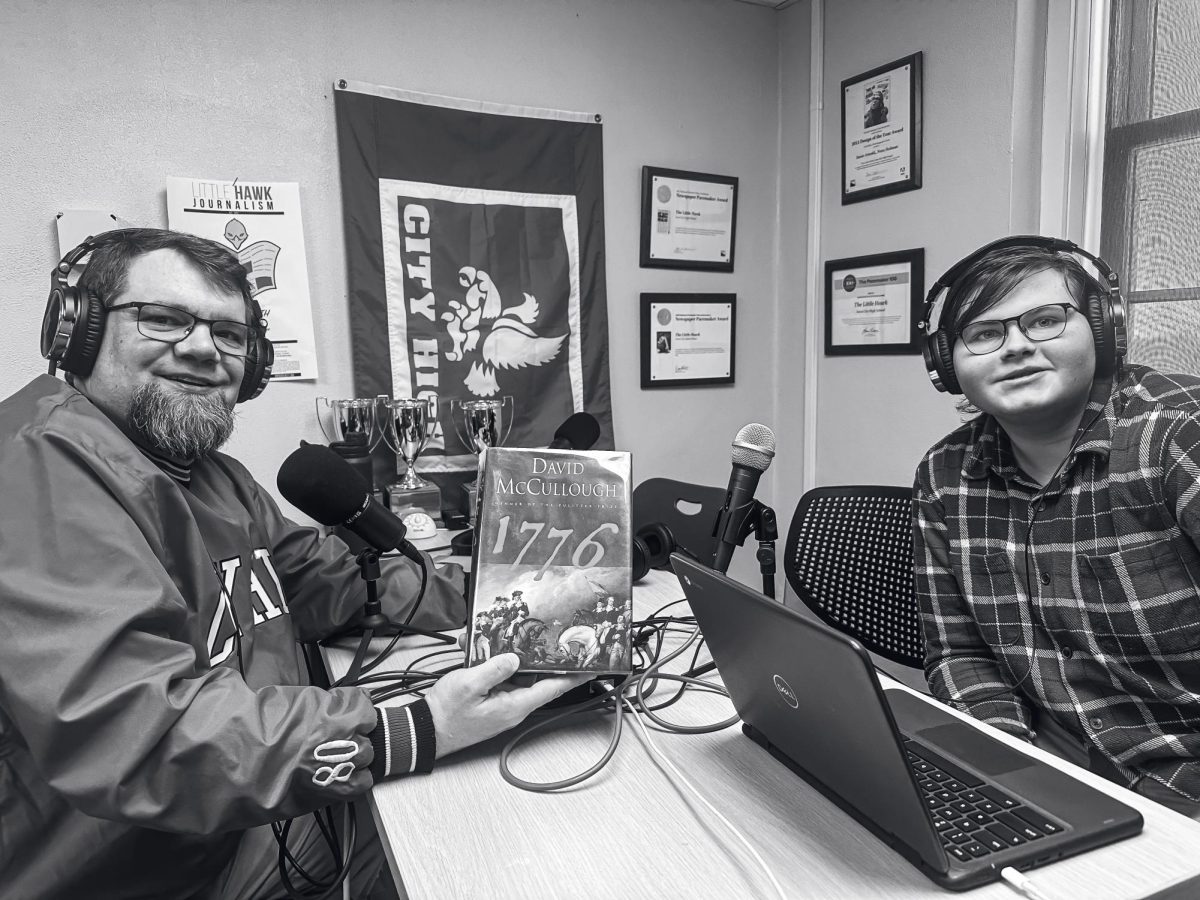Running With the Mind
Top-ranked athlete in track in field, Ani Wedemeyer opens up about her struggle with OCD and the tremendous growth she has existed within the past few years.
Freshman Ani Wedemeyer talking with the other three members of 4×400 relay., State Track, 2022 (The quartet placed first running 3:52.72)
March 9, 2023
Despite her prominent track and field career, running wasn’t Ani Wedemeyer’s primary sport until her freshman year of high school. For young Ani Wedemeyer (’25), gymnastics was a sport she couldn’t imagine living without. She was a top athlete who loved the sport and thrived in its environment. But she was more susceptible to additional stressors that came along with gymnastics, as well as other means of life. Why? The Diagnosis of OCD in her early teens proved to be a substantial component.
Obsessive Compulsive Disorder, defined by Mayo Clinic, “features a pattern of unwanted thoughts and fears (obsessions) that lead you to do repetitive behaviors (compulsions).” Obsessions are repeated images, thoughts, or impulses that feel out of said person’s control accompanied by intense feelings of fear, uncertainty, and/or disgust.
Ani had symptoms of OCD as early as the age of four. However, the compulsions and obsessions didn’t affect her substantially until competitive gymnastics became a large part of her life. 2020 was the peak of her struggle with OCD; stressors from the pandemic, gymnastics, and her obsessions made the period extremely difficult.
“It became disruptive when her behaviors with OCD were taking a big chunk of time out of her day. Her nighttime routine was close to an hour, preventing her from doing other things,” Ani’s mother, Elesa said. “By acting on the compulsion you’re “taking care” of the OCD chain, but the compulsions stack. So what becomes so debilitating is the stacking of those behaviors and the amount of time that it takes, plus the opportunity cost exchanged. They know it’s not normal, but they have to do it.”
The line between an obsessive personality versus a psychological disorder is the inability to silence these thoughts and engage in other activities if said person hasn’t “controlled” the obsession (along with the excessive accompaniment of feelings above).
Elesa remembers the many hours and dedication Ani put forth to compete in gymnastics.
“Ani loved it. It was super important to her, but I think she also regularly felt like she was missing out if she wanted to be able to compete at that level. It didn’t seem like it was worth it a lot of the time, but she loved it. What do you do as a parent?” Elesa Wedemeyer said.
To be eight and balancing sports or being a kid was a trade-off. Ani’s sister Iris saw the struggle.
“She was pretty much miserable during gymnastics and competition season, and she put a lot of energy into being perfect when it’s hardly ever possible to be perfect. She would be really hard on herself as a little kid if she wasn’t successful in a meet or on any given day; she could never just live life and be happy,” Iris Wedemeyer ‘23 said.
In October 2020, Ani was officially diagnosed with OCD after an assessment with a new therapist. Six months later (a few weeks after placing second in the regional gymnastics meet), she starts running.
A few weeks before the Junior High State track meet, 14-year-old Ani Wedemeyer made history. She steps off the track at the Northwest Junior High invitational meet, surrounded by anyone nearby. On May 11, 2021, Ani broke the South East 800m record of 2:30s (set by City High Track Alumni and Coach, Monica Mims) by almost 6 seconds. No one had been able to come close to that time for over two decades.
“Five years ago, I was in the mindset that the only sport I would ever love is gymnastics, and I would do it forever. I’d go to college, do gymnastics there, and no other sport can make me feel the way it does,” Wedemeyer (‘25) said.
Once she started running, the potential she existed grew exponentially, along with the leering possibility of a prominent track career. In late April of 2021, she quit gymnastics on her own terms and got ready for the next journey ahead. This extremely big change in her life facilitated her later success in track and cross country.

“I wanted to do something that made me happy instead of making me more stressed out. My OCD can get out of hand easily, but if I can channel it, then it can help me a lot with different things; athletics specifically,” Ani said.
Elesa views Ani’s utilization of her OCD to be her “superpower”.
“If you can distance yourself from the obsession and compulsion chain, you could recognize it for what it is. She’s able to walk this line where the hard parts about OCD drive her to pursue excellence, but she’s able to not cross over into this line with compulsion now. She’s learned to finesse it in a really beautiful way. This thing that was so dark, you know is actually this beautiful?” Elesa said.
That next year Ani beat her Junior High record by 12 seconds at the Drake meet, placing third. A month later, she beats her previous record by running a 2:11.99 at the state meet and won her first state title as a freshman. She also placed 3rd in the 400 running 57 seconds, and ran the 800 leg of the distance medley relay with a time of 2:10 seconds. In the 4×400 she anchored running 55 seconds, helping herself to another state title. That relay earned a school record along with the 11 fastest all-time in the state of Iowa. She walked away from the state meet with two gold medals, one silver, and one bronze.

“I would ask people to just try to understand that it’s not really a choice, and it takes a lot of work to retrain your brain not to think like that. Don’t get annoyed with them if they have some compulsion or something that they feel like they have to do; try to be understanding instead of judgmental, and just be supportive,” Ani said.
OCD can affect people of all ages, gender, and upbringing. Experts aren’t quite sure what causes OCD, but factors including environment, genetics, and other mental health disorders can be of influence.
“For people with OCD, their brain is telling them, yes, it will cause something terrible to happen if you don’t act on it. Even if deep down you know it won’t, you can’t stop thinking about it till you do it,” Ani said.
While nothing can ultimately get rid of OCD, seeking therapy and medication can reduce symptoms significantly. If you or a loved one are struggling with any of these symptoms, don’t hesitate to contact your health provider, reach out to a school counselor, or search for a therapy specialist near you.
“Reading this article may be a big surprise to some people that she has struggled with OCD. I would just offer to remind people that we rarely know all of the things that any individual is managing or navigating in their day-to-day life. I’m very proud of her for taking that risk and wanting to help others by sharing this story,” Elesa said.





































